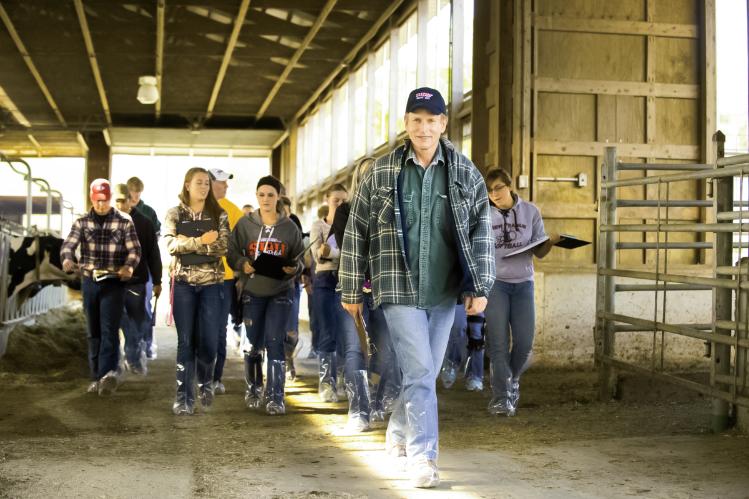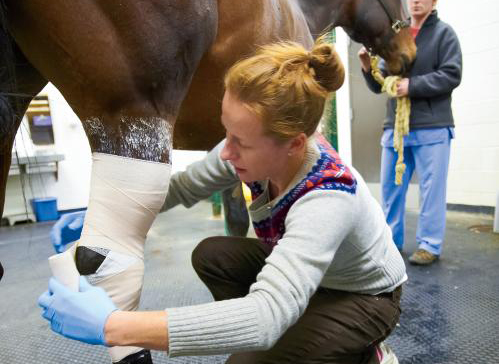Home > Wisconsin > Wisconsin Ag Education > Ag Education Programs Help Develop Leaders
Ag Education Programs Help Develop Leaders
In partnership with: Wisconsin Department of Agriculture, Trade and Consumer Protection.
It may have taken a Super Bowl commercial to remind us but by now, most people have probably heard about the “So God Made a Farmer” speech delivered by radio legend Paul Harvey at the 1978 FFA convention. It was a stirring tribute to the attributes of the American farmer and no doubt meant to encourage the youth in the audience to stick to their agricultural career path.
Today, working the fields is still a noble and necessary profession but the definition of an agricultural career has expanded to include food research scientists, chemists in research laboratories, teachers in ag classrooms or the engineers designing tomorrow’s high-tech farm equipment. Today’s Wisconsin FFA strives to make a positive difference in a young person’s life through agricultural education, developing their leadership potential and career success.
“It’s a place to succeed and grow as a person,” says Logan Wells, current state FFA President from Monroe, Wis.
There are more than 19,000 Wisconsin FFA members in 255 chapters across the state. These high school and college FFA members get involved in such things as Career Development Events that offer opportunities in areas that include Ag Sales and Farm Business Management to Nursery Landscape and Veterinary Science.
For example, Wells’ FFA experience started as a high school freshman. He didn’t grow up on a farm but thanks to an encouraging ag teacher, Wells has developed a passion for trees and the valuable resources they provide.
“Istarted my own portable sawmill business in high school that’s taught me a great deal about wood, wood products, forestry and business management,” says Wells, now a junior at UW-Madison majoring in Forestry Science. He is following a forestry career path possibly through Extension Service, teaching others about what he calls a “beautiful resource.”
Many of these FFA members probably got their start in a 4-H Club. The first Wisconsin 4-H Club, established through the University Extension Service, celebrates its 100th anniversary in 2014 and now, more than 300,000 youth are a part of some sort of Extension program in the state, with 50,000 taking part in a traditional club such as the 4-H program.
Wisconsin 4-H teaches youth leadership, citizenship and life skills and in Wisconsin, America’s Dairyland, there’s an added emphasis on animal sciences. But there are lessons to learn in other sciences, technology, engineering and mathematics too.
“When we look at preparing youth for a future in agriculture, we try to look beyond traditional roles,” says Valeria Johnson, the elected president for the Wisconsin 4-H Foundation. “If we can expose youth to the basic science that goes on behind everything then we’ll make our agricultural industry much stronger.”
Months of hard work by 4-H members are most visible at the numerous fairs around the state, but Johnson adds 4-H can take young people beyond borders.
“4-H can help our members look at agriculture from a larger and more global perspective,” Johnson says.
This solid FFA and 4-H background prepares students for agricultural career studies in college whether it’s the College of Agricultural and Life Sciences at the UW-Madison or UW-River Falls which offers the only agricultural engineering technology program in the state and is home to the largest dairy science program in the nation.
Or they could choose UW-Platteville and courses in agribusiness, agricultural education, animal science and horticulture. The School of Agriculture in Platteville also features Pioneer Farms where students get hands-on experience in farm conservation efforts, nutrient management planning, sustainability and much more. Wisconsin’s technical colleges also offer courses that prepare the next generation for entering the agribusiness and agronomy workforce.
The future of Wisconsin agriculture depends on the training and education of our young people.





